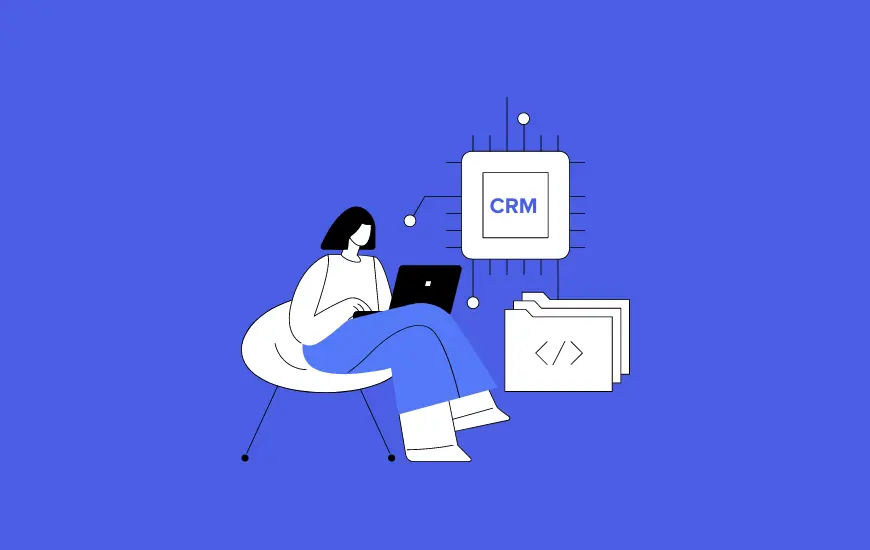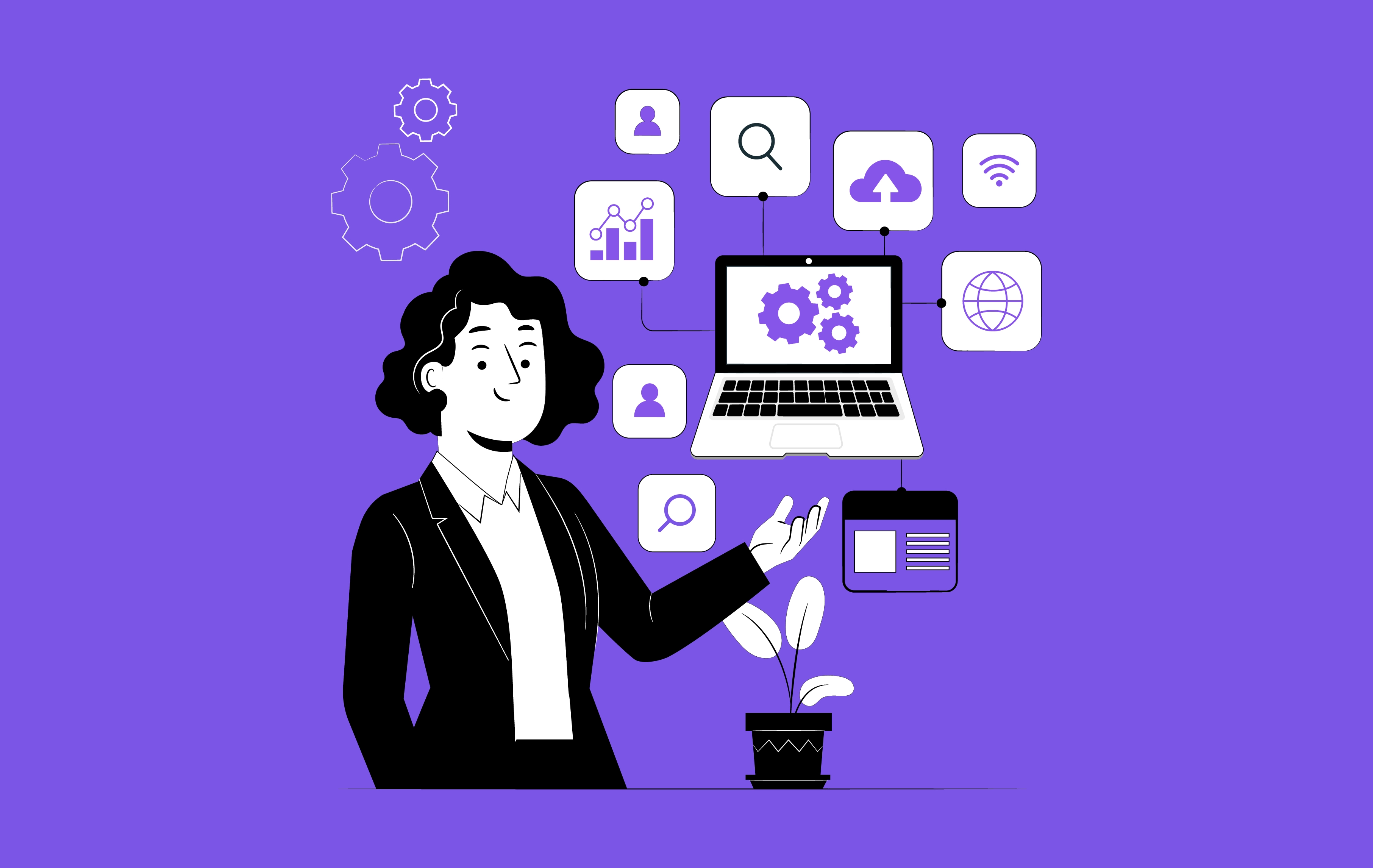- Differences between ERP and Basic Accounting Software
- Software
- Industry-specific
- The Myth and Facts about ERP Accounting Systems
- Myth 1: Budding and small companies do not need to develop ERP accounting software
- Myth 2: ERP Accounting software development cost is very high.
- Myth 3: Integrating an ERP accounting system with other tools is time-consuming
- Myth 4: Understanding the ERP accounting system is challenging
- ERP Accounting Software Features and Elements
- General Ledger
- Receivables
- Payables
- Payroll
- Analytics & Audits
- ERP Accounting Software Development Process
- Define the goal
- Prototype
- Develop
- Test
- Equip Your Team with ERP System
- Keep the team informed
- Assess your team’s ability
- Firm training plan
- Progress and Feedback
- How can Appinventiv Help with ERP Software Development?
- FAQs
There comes a time in every business when entrepreneurs can’t handle all financial accountabilities on their own. Supply chain, real estate, healthcare, education, and other industries require deep expertise and high-level management skill in finance. It creates a demand for experienced personnel and ERP accounting software development. ERP accounting software helps automate most of the processes with minimal human intervention.
Integration of ERP in financial management might seem very peculiar, as it is the impression that Enterprise Resource Planning (ERP) is normally associated with functions handling large amounts of data, for example, operations, customer relations, and sales. However, the truth is that ERP Accounting Software delivers much more than what simple accounting software does.
This article will help you understand everything you need to know about ERP accounting systems.
Differences between ERP and Basic Accounting Software
While basic accounting software with a set of modules is easily capable of performing specific financial tasks such as generating POs, billing/invoicing, electronic payments, expense handling, timesheets, etc., ERP accounting software goes a step beyond.
The ERP system for accounting and financial management can efficiently perform all the above-mentioned tasks. Additionally, it can track numerous tangible and intangible assets, like working hours, product life cycle, and other performance metrics. ERP accounting software can also automate various tasks performed by users in the finance department. It ensures that all the transactions are accounted for and reported accurately.

Here is a summary of the key differences between ERP and accounting software for better understanding.
Software
There is a broad difference in the scope of software when we compare these two systems, ERP and accounting software. Accounting software works stand-alone, whereas a financial ERP system integrates with the data from other tools used for different business processes.
Also Read: How much does it cost to build a custom AI-based accounting software
Industry-specific
Accounting software has a limitation when it comes to meeting industry-specific needs. An ERP system can be customized and deployed based on the specific industry such as a contruction ERP or organizational needs catering to a broader services landscape.
Despite these differences, there is still an assumption that ERP accounting software development is costly and time-consuming, unsuitable for all types of organizations. But the truth of the matter is that an ERP is much more robust, catering to every business’s needs. Let us break some of the myths around ERP financial software.
The Myth and Facts about ERP Accounting Systems
ERP accounting systems are becoming increasingly popular in the business world. As explained above, an ERP accounting system does much more than what accounting software does. It is more of an advanced approach to dealing with accounting issues where respective modules are integrated as a part of the ERP package. However, many myths surround ERP accounting software features, creating confusion and misinformation. So, let’s explore some of the common myths and facts about ERP accounting systems.
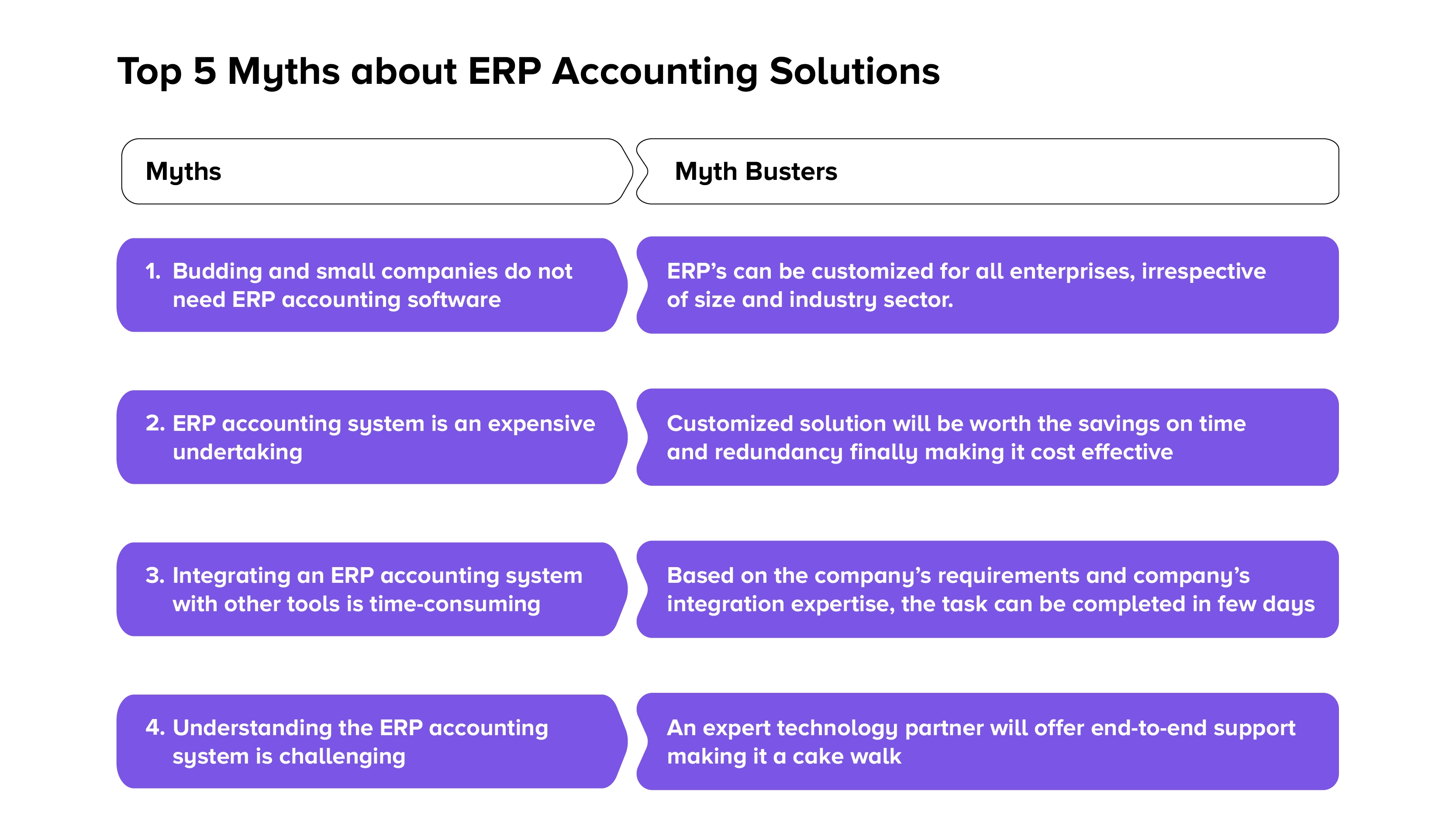
Myth 1: Budding and small companies do not need to develop ERP accounting software
Fact: Considering that the company is small with fewer staff members, the operations and accounting can be managed without needing any custom accounting software development is a false assumption. Even small-scale businesses, especially those that wish to grow, need an effective accounting system to ensure the smooth running of their workplace.
Appinventiv, as one of the leading ERP software development companies, can design ERP accounting software for companies of any size and industry.
Myth 2: ERP Accounting software development cost is very high.
Fact: The cost of accounting software development might seem like an expensive deal, but the multiple benefits and features of ERP accounting software outweigh its cost. Leaving tedious, repetitive tasks on such a system saves time and costs in two ways. One, by freeing up the resources to do more strategic tasks, and secondly, by making the process less error-prone, thus saving on rework. When compared with the benefits and results, the cost seems justified.
Myth 3: Integrating an ERP accounting system with other tools is time-consuming
Fact: One of the most common myths about implementing the financial ERP system is that it might take weeks or even months to integrate it with the existing technical environment of the company. The ERP accounting software by Appinvetiv can help you complete the configuration and integration in just a few days based on the initial business requirements stated at the time of planning.
Myth 4: Understanding the ERP accounting system is challenging
Fact: It is assumed that learning, understanding, and getting accustomed to the ERP accounting system demands extra hours and lengthy training sessions. Yet the employees only adapt to the new system by a trial-and-error method that takes additional time to complete their basic work. But proper training, user-friendly eLearning modules, prompt support, and effective maintenance services will surely lead to the path of easy learning and adapting to the new system that offers individual growth to the users.
An ERP accounting software helps the accounts payable team interact with vendors, generate invoices, pay to vendors, and manage debit and credit notes, among other tasks. On the other hand, it helps the accounts receivable team collect resources from internal and external customers, generate POs, and more. It will not be an exaggeration to say that the transactions handled by an ERP system are voluminous, complex, and repetitive. Thus cloud-based ERP accounting software development is indispensable for businesses.
Also read: ERP finance – Making Analytics and Reporting Easy for FinTech Enterprises
ERP Accounting Software Features and Elements
The basics of accounting elements act as the base of the accounting fundamentals. These elements remain intact for creating the accounting ERP software that makes it possible to support and monitor the company’s financial activities.
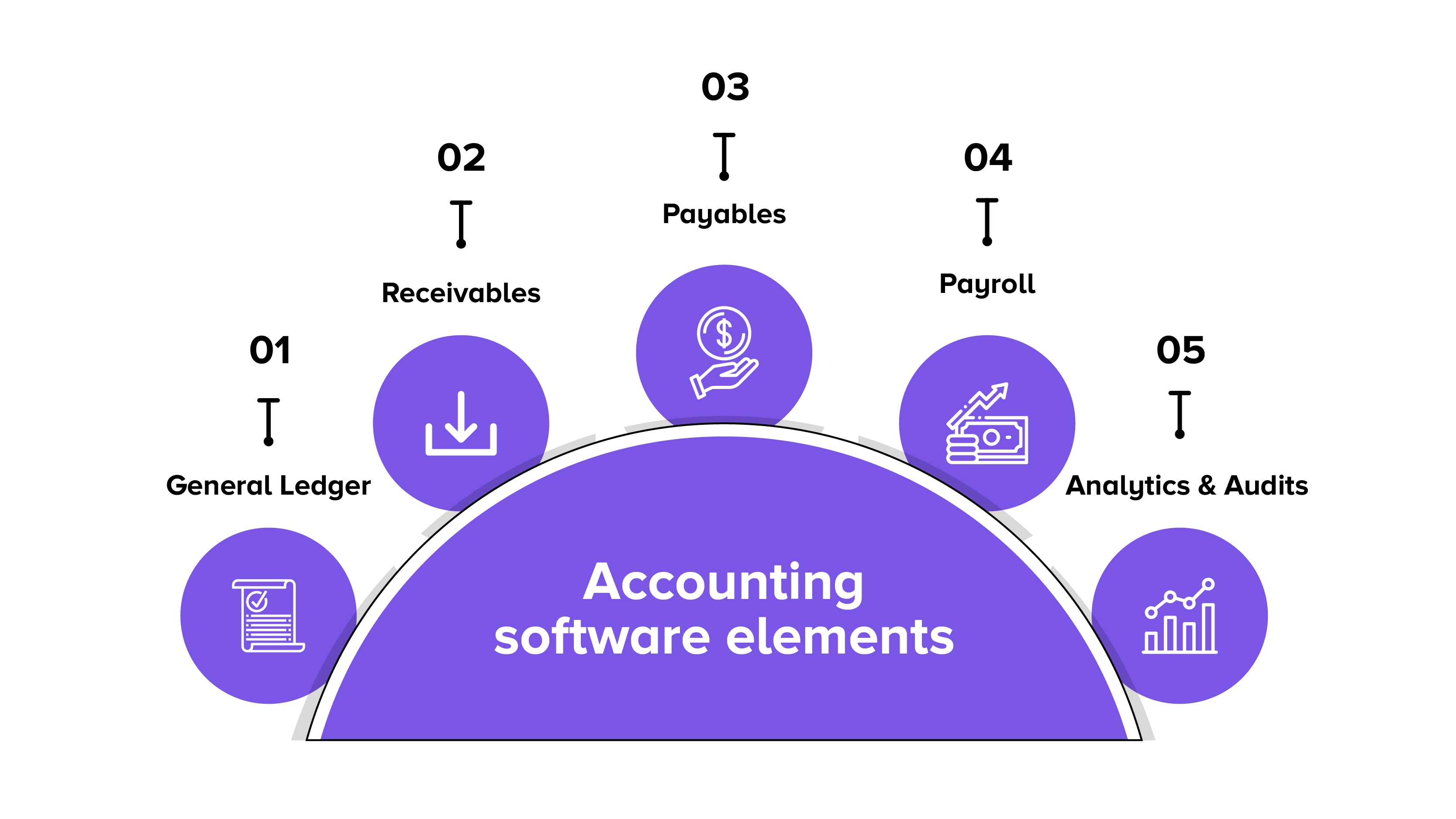
General Ledger
As the name suggests, this is the basic accounting book. Creating daily journal entries and collating them at the end of the period is a meticulously tedious job. One error can lead to a mismatch in the balance sheet, and you will have to start from scratch.
With the implementation of accounting ERP software, managing these journals can be automated. Additionally, the sub-ledgers can be integrated to reflect the transactions in the general ledger. Finance reports like trial balance, profit and loss statements, cash flow statements, and balance sheets can be generated with a few clicks, which makes it quick and effective.
Receivables
Also known as a customer ledger, this application keeps track of incoming transactions. Its primary role is to keep track of customer invoices, collections, commissions, etc. A robust financial ERP system, along with keeping track of all of the above, helps generate customer receipts when integrated with the interface of the cash management system.
Payables
Just opposite to receivables, payables track the outgoing transactions. Also known as vendor ledger, this feature of accounting ERP software keeps track of vendor transactions that include invoices, payments, credit memos, debit memos, etc. This can also be integrated with the cash management interface for vendor payments.
Payroll
When incorporated into financial management, the ERP system eases the payout process, such as capturing timesheets, calculating paydays, salaries, tax deductions, overtime payments, sales commission payouts, and much more. Correct and timely processing of salaries and other perks can also work as an advantageous retention tool by keeping customers happy.
Analytics & Audits
Gathering information and automating them all sounds good but it makes sense only if they help strategize business processes for growth and expansion. An effective ERP accounting system will take care of the compliance requirements when punching in details and processing them for the first time. Consequently, the tool will perform these steps meticulously without compromise, ensuring that your data is always audit compliant.
The data in one place can be converted into sensible analytics that will provide you with a wider perspective on the business process that is more profitable than the other. It will help you create strategies to improve and fill the process gaps for better results and overall organizational growth.
Also Read: A Complete Guide on Data Science & Analytics for Businesses
The various elements and features of an ERP system have given a clearer understanding of what is ERP system in accounting. Let us now look at the ERP accounting software development process.
ERP Accounting Software Development Process
“How to create an EPR accounting software” or “What is ERP accounting software development process” is one of the most asked questions when looking to implement it into the system. To answer this, here are the basic steps followed to build accounting software that is capable of meeting most of your business accounting needs:
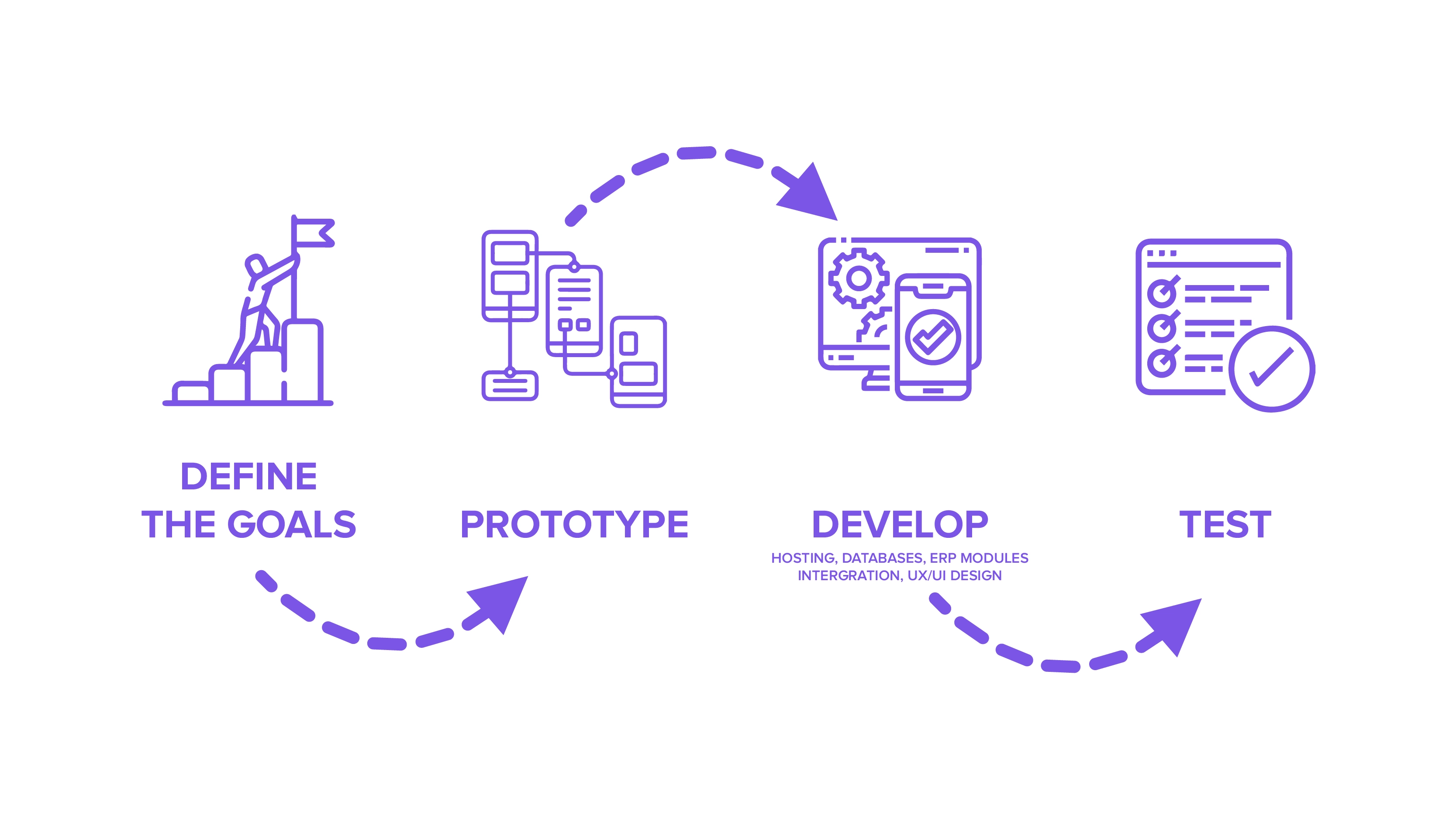
Define the goal
Clearly define the scope of work and reason for developing the ERP system. Set clear expectations and discuss the ways in which the goals can be achieved. Your chosen development firm can’t deliver the desired outcome as long as they don’t know your exact requirements.
Prototype
Create wireframes to visualize the user interface. Wireframes display how the future components of the application will be placed on the screen. With the help of UI/UX designers and business analysts, you can design the wireframes and ensure what to add and what to leave.
Develop
This stage includes choosing between a local server and a cloud server, managing and maintaining databases in a format that is easily scalable and flexible, smooth integration of the existing applications with the ERM system, and finally, designing your ERP software on the grounds of the wireframes created as prototypes.
Test
To ensure the effectiveness of your overall ERF accounting software development process and its successful implementation in the system, every aspect of the ERP should be thoroughly tested.
Equip Your Team with ERP System
Having a robust ERP accounting system in place does not suffice to add value to the process. It is important to go the extra mile and train your team to exploit the benefits of the ERP system to the maximum extent.
Keep the team informed
Implementing the new system brings along the requirement of putting in extra effort to learn along with performing the existing role. The transformation phase, at times, becomes challenging as not everyone in the team may like changes in the process and might not be ready to devote that extra effort to learning new things. Making everyone understand the vision behind bringing in the new system is the key to success. Also, it is important to communicate how it will help them in their personal growth by moving from monotonous jobs to strategic roles.
Assess your team’s ability
Knowing the strengths and weaknesses of the team is critical. Understanding the teams’ skill levels and desire to learn will greatly help plan future courses of action and adopt relevant techniques.
Firm training plan
A definitive and detailed training plan will help you and your team assess the time required to study and apply relevant features of the new system. A self-paced learning platform works best to train working professionals. However, timelines will still be required.
Progress and Feedback
While offering training through robust LMS, keep track of their learning progress and gather constructive feedback about the product and training modules.
How can Appinventiv Help with ERP Software Development?
With the fast-paced technological advancements in today’s digital landscape, it has been imperative for organizations to implement the latest tools and techniques like ERP accounting software. It will help your businesses strategize and plan future growth, enabling you to keep up with the competitive pace of the business world. ERP accounting systems can help you take a leap and gain a competitive edge in your industry.
ERP software development is a complex and challenging process with many variables. It is why you must rely on the top developers or a reputed accounting software development company for all your custom accounting software development needs. By using the expertise of a trusted technology partner like Appinventiv, you can get started with the development process of the customized ERP software more efficiently and achieve the desired result in the least possible duration.
With a proven track record and thousands of products delivered, we have the expertise and bandwidth to manage projects of every size and type. We know what it takes to develop accounting software for startups and large enterprises. With a team of more than 1200+ creative techies, we take pride in delivering cutting-edge digital solutions using the latest technologies within the specified and agreed timelines.
The positive testimonials from our clients and the diversified portfolio of projects across industries motivate us to perform better and serve every client with similar dedication. We can help you build an ERP accounting system tailored to your organizational needs. No matter your organization’s size or niche, automating the accounting system and opting for ERP software development services is an indispensable need of the time.
Reach out to our experts to discuss your ERP needs now.
FAQs
Q. What are the technologies used to develop ERP financial software?
A. There are more than one programming languages that you can choose based on your business needs and the kind of data you are going to use.
- Java – If your backend systems and workflows are complex, the Java-based ERP system will support the cloud-based ERP accounting system.
- .NET – By using .NET, or even better, ASP.NET, you can develop an ERP system that need not be cloud-based necessarily. Your ERP accounting module can smoothly function on basic internet connectivity.
- Python – As the ERP financial software is based on business logic and data, developing the financial system based on Python makes all the sense, as the core strength of the language is business logic programming.
Q. What are the primary benefits of using the financial ERP system?
A. There are multiple benefits that one can reap from its implementation. Some of them are:
- Retrieving detailed financial reports
- Fewer errors because of workflow automation,
- Reduced redundancy of resources
- No duplication of data entries, thus better control
- Financial data security
Q. Which is better? Off-the-shelf or custom accounting software development?
A. As the ERP accounting software is integrated with other internal functions for data fetching and overall reports, it is best to opt for custom accounting software development to meet all your business requirements and goals best.
Q. How much does it cost to build ERP accounting software?
A. The cost of building an ERP accounting software varies significantly depending on various factors, such as the complexity of the system, the size of the business, the features and functionality required, the number of users the system will support, and so on.
So, depending on these criteria, the cost to build ERP accounting software can range from $50,000 to $400,000.
Q. How long does it take to develop an accounting software?
A. The time to create accounting software varies depending on several criteria, particularly what type of ERP you want – cloud based accounting software development or web based accounting software development, and various other feature sets.
However, in general, it can take anywhere from a few months to a year or more to develop a comprehensive ERP accounting software. You should carefully plan and prioritize features to ensure the ERP accounting software development process stays on track and meets the intended timeline.


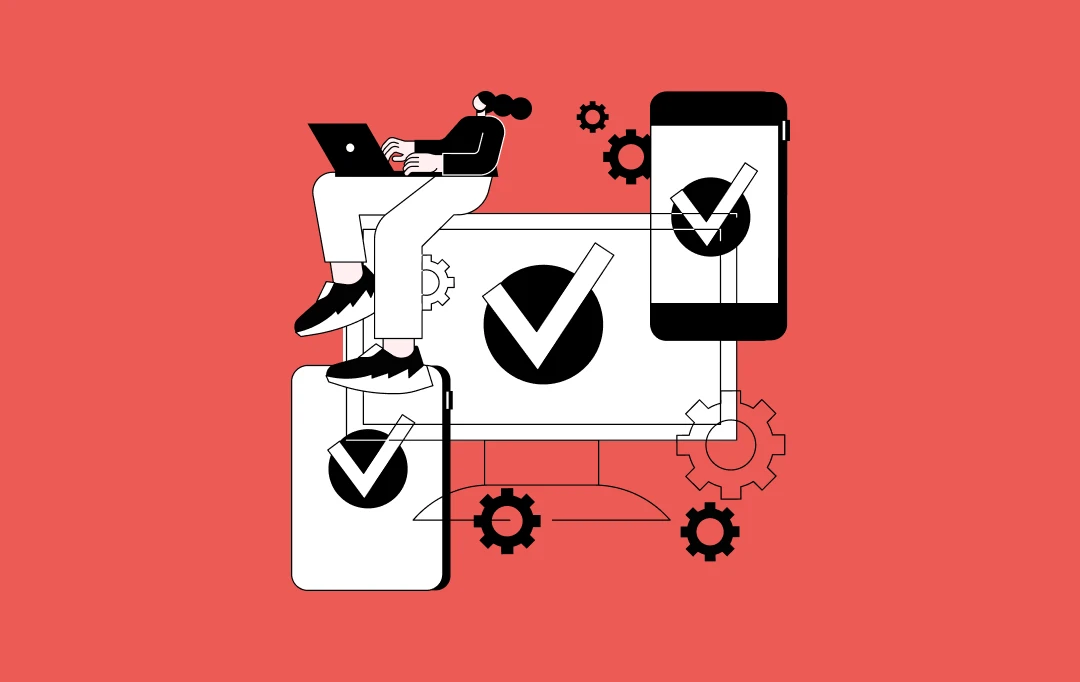
Enterprise Application Integration - How It Works and Why It Matters to Your Business
In the fast-paced corporate world, CEOs and CTOs are often tasked with managing multiple systems and departments, each playing a crucial role in the success of the company. But what happens when these systems don’t communicate effectively with one another? Imagine your sales team's inability to instantly share data with your inventory management or customer…

Mobile CRM - The Key to Driving Success in the Modern Business Landscape
In a world where business agility translates to success, embracing Mobile CRM can be a game-changer. It provides immediate access to customer data, significantly boosting your responsiveness and operational effectiveness in a competitive market landscape. These systems ensure that relevant customer information is just a tap away, enhancing decision-making, optimizing customer interactions, and significantly boosting…
